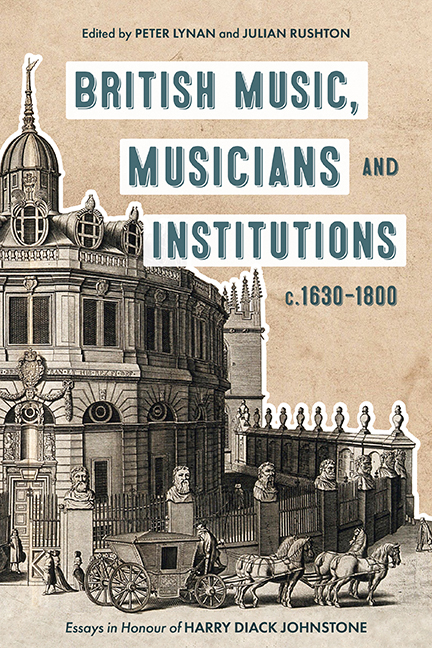Book contents
- Frontmatter
- Contents
- List of Illustrations
- List of Music Examples
- List of Contributors
- Acknowledgements
- List of Abbreviations
- Note to the Reader
- Introduction
- Part I Performers and Performance Style
- Part II Composers and Secular Institutions
- Part III Sacred Music and Institutions
- Part IV Dissemination: Copying, Printing, and Publishing
- Epilogue: Musica Britannica and the Eighteenth Century
- Harry Diack Johnstone: A Tribute
- Bibliography of the Publications of Harry Diack Johnstone
- Index
- Tabula Gratulatoria
Harry Diack Johnstone: A Tribute
Published online by Cambridge University Press: 06 October 2022
- Frontmatter
- Contents
- List of Illustrations
- List of Music Examples
- List of Contributors
- Acknowledgements
- List of Abbreviations
- Note to the Reader
- Introduction
- Part I Performers and Performance Style
- Part II Composers and Secular Institutions
- Part III Sacred Music and Institutions
- Part IV Dissemination: Copying, Printing, and Publishing
- Epilogue: Musica Britannica and the Eighteenth Century
- Harry Diack Johnstone: A Tribute
- Bibliography of the Publications of Harry Diack Johnstone
- Index
- Tabula Gratulatoria
Summary
Harry Johnstone is one of our most distinguished scholars of music in eighteenth-century Britain. Canadian by birth, he studied at the Royal College of Music, London, and at Balliol College, Oxford, where he was organ scholar. His musicological interests were encouraged by Walter Emery, the great Bach scholar, who became his scholarly mentor in the late 1950s. Subsequently, he took as the subject of his doctoral work at Oxford the composer Maurice Greene, who, though now recognized as one of the most gifted English musicians of his day, was then a decidedly unfashionable topic for scholarly research. English music of the period, long considered to have been in the doldrums by comparison with the European mainstream, has since revealed its considerable riches, in no small part thanks to the work of Harry and other pioneers in the field.
Harry was a lecturer at the University of Reading before returning, in 1980, to Oxford, as a university lecturer (later Reader) and Fellow (now Emeritus) at St Anne's College. There, in addition to his teaching and administrative duties, he was involved in practical music-making, an aspect of his professional life that at both Oxford and Reading saw him conduct rare performances of some of the English music that so interested him. He participated in the ceremonial aspects of the university calendar. As Dean of Degrees, begowned and declaiming in Latin, he would present successive cohorts of students for the conferral of their degrees at the Sheldonian Theatre. That Handel too had in 1733 played to an audience in that very room is a happy coincidence.
Highly regarded for his research into Handel's English contemporaries, Harry has also made notable contributions to our knowledge of music in the late seventeenth century, and his publications reveal his particular interests in the history, performance practice, and sources of music that shaped British musical culture of the era. As co-editor, he brought to fruition volume 4 of The Blackwell History of Music in Britain, which had been planned by the late Roger Fiske. The resulting book, published in 1990, was the first to treat the eighteenth century as a whole, and its comprehensive coverage and extensive bibliography remain a starting point for researchers. He is the author of numerous book chapters and articles, and he has written entries for all the major reference works.
- Type
- Chapter
- Information
- British Music, Musicians and Institutions, c. 1630-1800Essays in Honour of Harry Diack Johnstone, pp. 277 - 278Publisher: Boydell & BrewerPrint publication year: 2022

